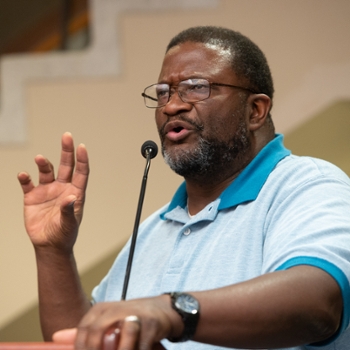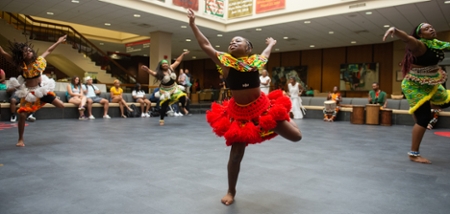 Four hundred years ago, the first Africans landed in Old Point Comfort, Virginia. Southern Illinois University Edwardsville Black Studies Program and the Office of the Provost presented its 1619 Commemoration recognition with an opening ceremony at noon Monday, Sept. 30 in the Morris University Center, Goshen Lounge.
Four hundred years ago, the first Africans landed in Old Point Comfort, Virginia. Southern Illinois University Edwardsville Black Studies Program and the Office of the Provost presented its 1619 Commemoration recognition with an opening ceremony at noon Monday, Sept. 30 in the Morris University Center, Goshen Lounge.
“There are many people who do not know the significance of this date,” said Kathryn Bentley, associate professor in the Department of Theater and Dance and director of the SIUE Black Studies Program. “This week, we will give the attention and recognition that this date deserves. It is important that we recognize how the events in 1619 changed the course of history for the entire world.”
“This is an event that made America what it is today,” said Anthony Cheeseboro, PhD, associate professor of historical studies in the College of Arts and Sciences (CAS) and keynote speaker.
Cheeseboro’s presentation was entitled, “The Most Important Event in History with No Date.”
 “We don’t have an exact date. People have generally settled on Aug. 20, 1619, because they knew the ship with slaves came toward the end of August,” said Cheeseboro. “These Africans were brought into the colony of Jamestown involuntarily. They had been captured in what is now Angola, a territory ruled by the Portuguese.”
“We don’t have an exact date. People have generally settled on Aug. 20, 1619, because they knew the ship with slaves came toward the end of August,” said Cheeseboro. “These Africans were brought into the colony of Jamestown involuntarily. They had been captured in what is now Angola, a territory ruled by the Portuguese.”
“Yet, when Africans were first brought to North America, they weren’t even purchased, they were bartered,” Cheeseboro continued. “The pirate ship that captured the slaves originally from the Portuguese eventually came to Virginia with little food. They traded Africans for food to get to where they needed to go.”
These Africans, who would become slaves, were actually indentured workers when they arrived in Virginia, according to Cheeseboro.
“Many people want to point out that 1619 was not the beginning of slavery in the Americas,” he noted. “It would take about 40 years, when in approximately 1660 laws were passed in Virginia to say unless blacks had papers saying they were free, the assumption was that they were slaves. It took a generation or so to where being black became synonymous with being a slave.”
Cheeseboro continued to point out the great skill and fortitude of the African workers that made them a desirable commodity.
“Africans were also able to withstand many diseases and health conditions in the Americas, because they came from the Eastern Hemisphere like Europeans. They had been exposed to such illnesses as tuberculous, small pox and influenza,” remarked Cheeseboro. “They also had heightened resistance to tropical diseases like malaria and yellow fever, and so it made a lot of sense from a financial standpoint to have African slaves.
“Also, do not underestimate the skills of Africans. Africans came to the Americas knowing how to grow rice, and they had good cattle and woodworking skills. Africa was also the first part of the world that consistently produced iron as a useful metal.”
“It is important to understand that slavery did not equal lack of knowledge or stupidity,” cautioned Cheeseboro. “At the end of the day, a slave was an economic investment.”
“To those who say 1619 is not as important to history, I say you’re dead wrong,” concluded Cheeseboro. “It is not where slavery starts, but it is where Africa Americans and much of American culture today has its origin.”
Opening and closing Monday’s ceremony was the Spirit of Angela: Traditional West African Dance and Drum of St. Louis. Moma Fatoumata is the founder and creative director. Tiffany Pool is the lead instructor and choreographer.
Other events this week include:
Noon, Today – Lovejoy Library / Friend’s Corner
Bryan Jack, PhD, associate professor of historical studies in CAS, will moderate a panel on Faculty Perspectives on 1619.
Noon, Wednesday, Oct. 2 – Lovejoy Library / Redmond Reading Room
The Black Studies Student Advisory Board will present “How You Comin’?” – a conversation about the New York Times 1619 Project. Opening performance by SIUE Black Theatre Workshop.
Noon, Thursday, Oct. 3 – MUC / Goshen Lounge
“What Does Freedom Mean to YOU?” – a 24-hour social media conversation and an interactive art display.
Photos:
Anthony Cheeseboro, PhD, associate professor of historical studies in the College of Arts and Sciences (CAS) was the 1619 Commemoration opening ceremony’s keynote speaker.
Opening and closing Monday’s ceremony was the Spirit of Angela: Traditional West African Dance and Drum of St. Louis.